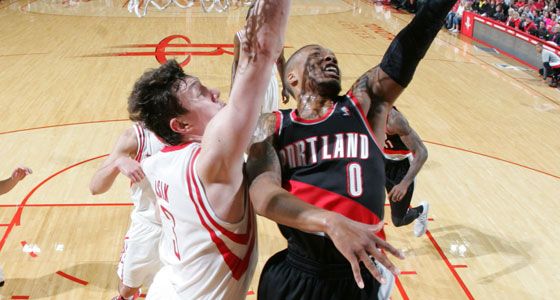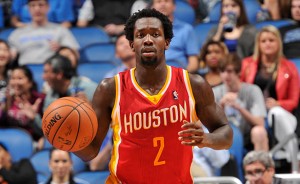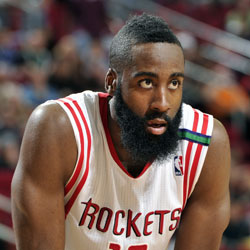
The defense of Omer Asik could be crucial against LaMarcus Aldridge and a large Portland front line.
The scenario math is over. Courtesy of Portland’s overtime win over Golden State on Sunday night, we know the Rockets (53-27) will open up the postseason next weekend against the Blazers (53-28) in the 4 vs. 5 series, with the winner likely to play No. 1 San Antonio in the next round.
What we don’t know is where each game will be played. The Rockets are still in the driver’s seat for home-court advantage, but they need one more result to seal it.
If that happens, and assuming good health, the Rockets have to feel good about their chances. The Rockets won the tiebreaker vs. Portland by virtue of taking three of four regular-season matchups, including both in Houston.
There’s also the fact that in a similar 4 vs. 5 battle five years ago, the Rockets took out LaMarcus Aldridge and his Blazers in six games, marking Houston’s only playoff series win since 1997. (Though it should be noted that not even one current Rocket was on that roster.)
As far as the current crop of Rockets goes, a quick look at the schedule and numbers between the teams shows several trends. Here’s a rundown of the relevant issues:
As most of us know, Houston’s magic number to clinch the No. 4 seed, and home-court advantage over Portland, is one. It seems simple enough on paper: basically, the Rockets need only one of three games (Spurs at Rockets tonight, Rockets at Pelicans on Wednesday, Clippers at Blazers on Wednesday) to go in their favor. In a usual circumstance, the pro-Rockets outcome would be favored by oddsmakers in all three (though San Antonio might be a tossup).
But Houston shouldn’t count on help from the Clippers. Unless current No. 2 Oklahoma City somehow loses each of its final two games (at New Orleans tonight, home vs. Detroit on Wednesday), the No. 3 Clippers will know by their West Coast tipoff in Portland on Wednesday whether they have anything left to play for. Since it’s highly likely they will not, expect very limited minutes – if any – for the likes of Chris Paul and Blake Griffin, thus giving Portland a probable win.
So, the Rockets will likely need to close the door themselves. They will likely be favored in each, considering the ravaged state of the New Orleans roster and the probability that Gregg Popovich will keep his biggest stars on a minutes limitation in Houston. But given that it’s the Spurs, and remembering the trouble the Pelicans gave the Rockets (albeit without Chandler Parsons) just two nights ago in Houston, it’s far from a done deal.
The week-plus-long experiment to open the 2013-14 season of playing Omer Asik at power forward alongside Dwight Howard was mostly a failed one… with one very notable exception. Back on November 5, the Rockets rolled into Portland and crushed the Blazers, 116-101, behind strong performances from both big men. Asik, who spent most of his 22 minutes guarding Aldridge, held Aldridge to 21 points (9-of-19 shooting) and only 5 rebounds and a plus/minus number of -22, easily the worst on Portland’s roster that night.
On the day before the most recent Houston-Portland matchup on March 9, the Rockets brought back the Howard-Asik combination in practice. It didn’t end up happening in the game due to foul trouble, but head coach Kevin McHale and the rest of the Houston staff clearly had the possibility on their minds. And with Asik averaging over 10 points and 15 rebounds in a recent 8-game stint filling in as a starter for Howard, he appears very much in game shape to potentially take on a larger role.
Meanwhile, Howard has to like his chances against Portland center Robin Lopez. Howard has averaged 25.5 points against Portland – his highest per-game average against all West opponents – on a ridiculously impressive 63.3% from the field and even 65% from the free throw line. Oh, and he’s also grabbed 13.5 rebounds and 1.8 blocks in those four games.
On the whole, most of the Houston bigs probably like this matchup. The exception is starting power forward Terrence Jones. In three starts against Portland, Jones put up just 4 points and 2 rebounds in 16 minutes. That could spark a renaissance of the Asik-Howard experiment, or it may also force the Rockets to go small with Jeremy Lin at shooting guard and Harden and Parsons at the forward spots, as they did during the recent March 9 comeback in Houston.

Beverley’s defense has given Damian Lillard fits.
The biggest perimeter reason the Rockets won three of four regular-season games from Portland was the inefficiency of Damian Lillard. Hounded by Patrick Beverley and his relentless defense, Lillard shot 38.5% against the Rockets (including a 1-of-10 clunker in Portland) and averaged nearly as many turnovers per game (4) as assists (5).
There is some caution, though. After not being in foul trouble in any of the first three games vs. Portland, Beverley was whistled for six fouls and disqualified in overtime during Houston’s miraculous come-from-behind win last month. Perhaps not coincidentally, Lillard also had his best game from the field (7-of-13) that night. It’s still a favorable matchup for Houston, but Beverley has to be careful to not pick up cheap fouls and remain on the floor.
On paper, it’s an intriguing matchup of long, athletic small forwards with handles. In reality, it’s been a mismatch in favor of Houston. Parsons has averaged 17.5 points (on 46% shooting) and 7 rebounds in his four games, while Nicolas Batum has been limited to 10.5 points on just 40% from the field, well below his efficient season-long average of 46.5%.
If Beverley is able to contain Lillard, it stands to reason that the Blazers will need someone else to step up as a perimeter creator on offense in order to beat Houston four times in seven games. Batum is one candidate, but Parsons has held him considerably in check. That leaves one question…

Harden’s ability and desire to defend will be tested by Wesley Matthews and the Blazers.
We all remember the wizardry James Harden has pulled off vs. the Blazers, none more impressive than the stunning comeback he orchestrated against them in March. And the numbers certainly bear it out – in four games, Harden has averaged 30.2 points (on 48.1% shooting), 7.3 rebounds and 5.3 assists. In short, Harden has been dominant and efficient at a Kevin Durant-level on offense against the Blazers.
But Harden has needed all of those points to have a significant impact because of his struggles on defense against Wesley Matthews. Portland’s steady two-guard has torched the Rockets for over 20 points per game this season, including 26 on March 9 when he went to the free-throw line a staggering 13 times. Harden actually did a decent job in defending Matthews from the field (5-of-15 shooting), but it was the endless penetration and trips to the line that wreaked havoc.
The Rockets have to like their chances on the defensive end of the floor. Beverley and Parsons have each held Lillard and Batum well below their usual marks. Asik has shown considerable promise in guarding Aldridge. Lopez isn’t really a creator of his own offense, which should allow Howard to offer some help elsewhere.
The remaining X-factor is Matthews. If Harden can keep him out of the lane and resist the temptation of leaving his man to unnecessarily help elsewhere, the Rockets should be just fine. If not, that’s the matchup Terry Stotts and the Blazers will likely look to exploit.